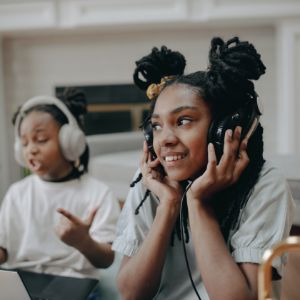The Value of Voices of Oklahoma to Students and Educators
Voices of Oklahoma was founded to preserve the legacy of the state of Oklahoma and to create a wealth of content that students and educators can draw from to learn and enrich their studies and lessons alike.
No matter your city or state Voices of Oklahoma is a valuable resource in supporting successful student achievement and empowers them to more deeply examine the development of Oklahoma through the examination of important cultural, political, economic, and ideological movements in our state’s history.

The Content of Voices of Oklahoma
Voices of Oklahoma provides invaluable primary source information to help students in their research projects.
Many curriculums require that students recall information from print and digital sources in order to analyze information, determine central themes, and summarize key events or ideas.
When conducting research, students are to use multiple print and digital sources to present knowledge. Oklahomans interviewed in Voices of Oklahoma represent a wide range of occupation and historic significance. New subjects are continually added, making the resource dynamic and current

Content Format
All audio files are broken into chapters to help the student break up research into smaller sessions, or to simply refer to a more relevant specific section of the person’s life that better aligns with the student project.
Transcripts of the audio file are provided during listening sessions to aid in understanding. This is of special significance when working with English Language Learners.
All content is searchable throughout the site via keyword search throughout the website, allowing students to instantly see both interviews and the topics that surround them

Essential Questions
Essential questions are open-ended and invite exploration of ideas. There is no right or wrong answer, and questions are meant to be debated and discussed using examples from the text to support opinions.
Often they include such words as “how,” or “why.” The following questions are generic and useful when discussing any biographical subject.
How did the person’s decisions and actions change his/her life?
Why is this person successful and/or remembered today? Include evidence from the person’s life to support your opinion.
Compare and contrast two people who lived at the same time in Oklahoma’s history. How do their actions and consequences vary depending on their different life situations, ideas, and perspectives?
After hearing about your person, what do you think are the most important requirements for leadership and how did your subject manifest these?
Citing Voices of Oklahoma Content
Students will follow current MLA guidelines for citing websites when using Voices of Oklahoma in research projects. MLA citations can be easily found at the bottom of every interview to help students expedite the assembly of their sources.
How Voices of Oklahoma is Helping Educators

Chelsea Ball, Ph.D.
Director, Museum Studies
Assistant Professor, Department of History & Geography
College of Liberal Arts
University of Central Oklahoma
“I first encountered Voices of Oklahoma as a master’s student searching for oral histories and resources on feminism and women’s rights in Oklahoma. I was immediately impressed by the website’s design, the high-quality audio recordings, and the accompanying transcripts for each interview. More than that, I was struck by the profound connection to history that comes from hearing a firsthand account. This experience inspired me to pursue a similar approach in my own research.
My work focuses on the Equal Rights Amendment (ERA) in Oklahoma, a topic with limited available sources—only a few archival collections and a handful of articles. Motivated by John’s oral history efforts, I sought out key figures in the ERA debate and conducted my own oral history interviews to ensure their stories would be preserved for future generations. This continued in my dissertation and now book project, where oral history remains the foundation of my work.
Now, as a professor, Voices of Oklahoma continues to be an integral part of my teaching. In my freshman U.S. history courses, students listen to Otis Clark’s recollections of the Tulsa Race Massacre. When I taught Oklahoma History at the University of Oklahoma, I incorporated excerpts from John’s interviews into lectures on the Dust Bowl and required students to incorporate at least one oral history into their research papers. As the Director of Museum Studies at the University of Central Oklahoma, I continue to use Voices of Oklahoma as an educational tool. In my Oral History Theory and Practice course, students engage with these interviews as part of their coursework, using them both as learning materials and as models for their own oral history projects.
As both an educator and an oral historian, I have witnessed the profound impact of oral history in fostering connections between students and the past. Hearing a personal narrative allows students to engage with history in a way that traditional sources—documents and letters—often cannot. These first-hand accounts provide a tangible link to historical events, making them more accessible, meaningful, and memorable.”
